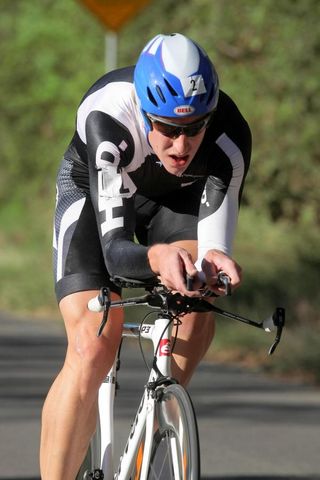Zirbel reacts to Contador’s dropped case
Claims strict liability is an easy get out for the anti-doping authorities but that Contador's case was inconsistent

The Royal Spanish Cycling Federation’s (RFEC) decision to drop all charges against Alberto Contador on grounds of ‘no fault or negligence’ following a positive test for the banned substance Clenbuterol has provoked a reaction from Tom Zirbel, who is currently serving a two-year suspension for a doping violation.
“I think authorities should be forced to gather more evidence and try to understand what really happened in every case,” Zirbel said. “My first reaction to the initial news of Contador's positive was hope. I hoped that he was telling the truth because he had the resources to fight the charges and hopefully prove ingestion through contaminated food and that could have ultimately led to the dissolution of the “strict liability” rule,” he told Cyclingnews.
USADA issued Zirbel with a two-year suspension for producing a positive A and B sample for the banned substance Dehydroepiandrosterone (DHEA) following the US Professional Championships on August 29, 2009. He stated that he did not knowingly ingest the substance and worked with a team of chemistry specialists to determine the possibility of food contamination as the reason for heightened levels of the substance in his urine. He was unable to prove food contamination and with limited resources, time and energy he was eventually forced to accept punishment.
Zirbel’s case was ruled in favor of sanctioning based on the evidence acquired against him from two urine samples. The verdict was also based on the grounds of “strict liability.” The World Anti-doping Agency (WADA) code 2.2.1 states, “it is each Athlete’s personal duty to ensure that no Prohibited Substance enters his or her body. Accordingly, it is not necessary that intent, fault, negligence or knowing Use on the Athlete’s part be demonstrated in order to establish an anti-doping rule violation for Use of a Prohibited Substance or a Prohibited Method.”
“‘Strict liability” is an easy get out for the anti-doping authorities,” Zirbel said. “It sounds nice in theory but it's near impossible to know exactly what's going into your body, unless you have the resources to double and triple check everything prior, and it's ultimately terrifying to every athlete who gets tested. I think we can do better than “strict liability.” Though it is the rule currently in place and we need to adhere to the rules and try to be as consistent as possible. Otherwise, our sport loses credibility for reasons that are obvious.”
“If you're going to have a rule like "strict liability", you're going to need some sort of special circumstance clause,” he added. “Every once in a while, it's warranted. There was news last year that Track and Field sprinter Ben Johnson had his drink spiked with steroids by some hater that resulted in a two-year ban back in the late 1980s. Crazy stuff happens. I think it's better to be overly cautious and work harder to ensure we're sanctioning actual cheaters.”
"In Contador’s case, he tested positive after producing small amounts of Clenbuterol up to 50 picograms/ml in a urine sample taken from July 21, on the second rest day of the Tour de France. He claimed that he ingested contaminated meat as his defence. However, he failed to produce the contaminated meat as evidence."
Get The Leadout Newsletter
The latest race content, interviews, features, reviews and expert buying guides, direct to your inbox!
After a lengthy hearing, the Royal Spanish Cycling Federation cleared Contador of all charges based on (International Cycling Union (UCI) article 296, which says that an athlete can be exonerated if they prove that they had inadvertently ingested a banned product through no fault or negligence on their part. Furthermore, the Spanish Prime Minister stated that there were “no legal grounds to sanction Contador.”
“If Contador's defense team was unable to provide any direct proof of their claim of contaminated meat, then it was completely inconsistent with my case and every other case that I know of,” said Zirbel, “I don't think the inconsistency was because of money alone, look at some of the high profile cases vs. USADA in the past. It looks to be a combination of money, status, and what the prosecution had to lose.”
Zirbel echoed the opinion that an independent panel, outside of the national sport governing body, should handle doping cases to avoid the possibility of a bias outcome. “He's a national hero and a prominent source of national pride,” Zirbel said. “Would we ever form a jury of family members or friends of the defendant in a criminal court of law?”
The UCI or WADA have not confirmed whether they will decide to appeal the Royal Spanish Cycling Federation’s decision to drop all charges against Contador. If they decide not to make an appeal, it is possible that his case could set a new precedent for future athletes who test positive.
When asked if he considered appealing his case, using Contador’s as an example, Zirbel said, “I'm sure that would give USADA a good laugh.”
“USADA has shown that they are completely consistent with how they handle doping violations, which is to take the hardest line available to them by the WADA Code. No, it hasn't crossed my mind...though I do remember having some tasty beef two days before my positive test.”

Kirsten Frattini is the Deputy Editor of Cyclingnews, overseeing the global racing content plan.
Kirsten has a background in Kinesiology and Health Science. She has been involved in cycling from the community and grassroots level to professional cycling's biggest races, reporting on the WorldTour, Spring Classics, Tours de France, World Championships and Olympic Games.
She began her sports journalism career with Cyclingnews as a North American Correspondent in 2006. In 2018, Kirsten became Women's Editor – overseeing the content strategy, race coverage and growth of women's professional cycling – before becoming Deputy Editor in 2023.
Most Popular



